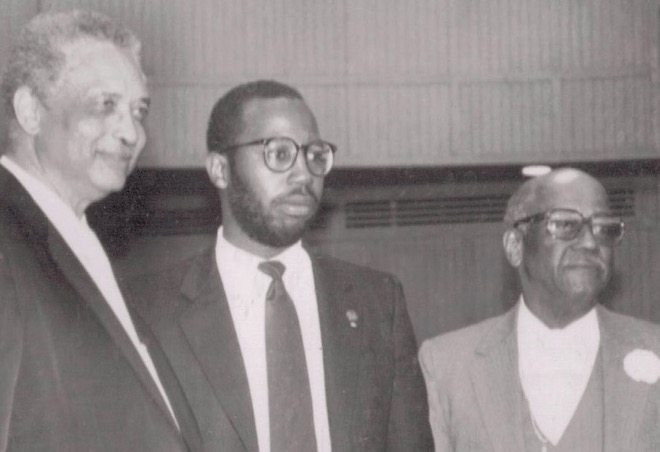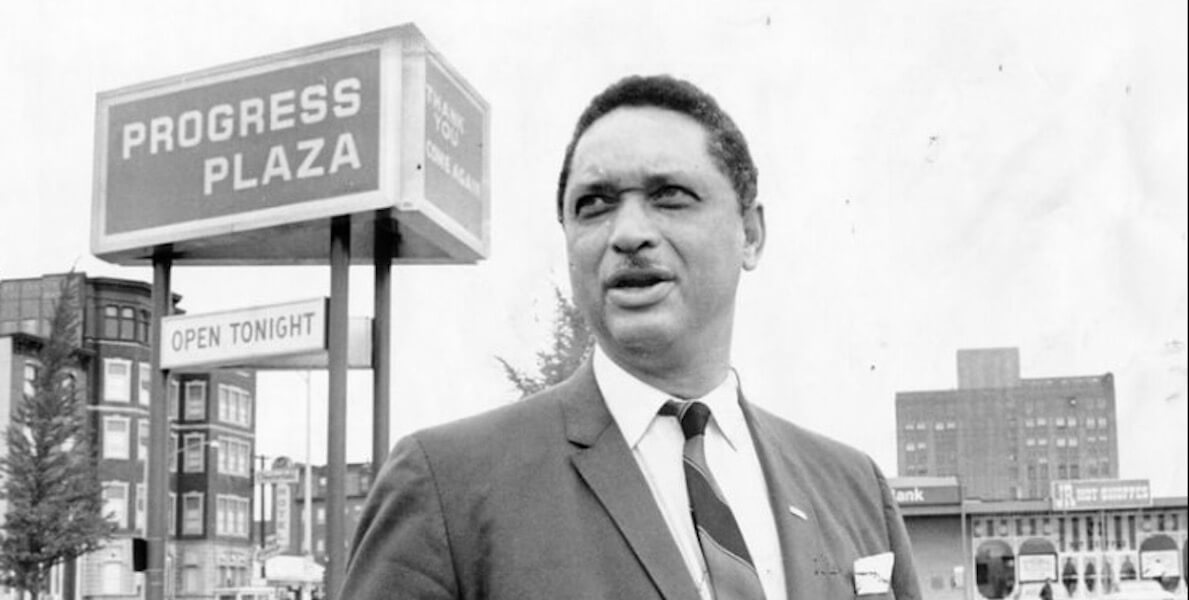On October 16, Reverend Dr. Leon Sullivan would have turned 100 years old. Affectionately and reverently known as the “The Lion of Zion,” Sullivan was a spiritual giant and civil rights champion. In 1950, he began his 38-year tenure as the pastor of Zion Baptist Church on Broad and Venango streets. From there, he revolutionized the impact of the local church on global issues.
Rev. Sullivan used the church to organize the Black community and to create a local economic base that would self-perpetuate. While his work centered around the principle of self-help, he realized the role of partnerships within communities and the broader society to foster opportunities for the marginalized in our society, especially Black people.
Two decades after his death, that work continues through the service of those he mentored, like Reverend Michael Major, a North Philly-born financier and founder of Called to Serve Community Development Corporation (CDC), designed to foster renewal in Nicetown-Tioga through education, entrepreneurship and community empowerment.
Major grew up in the 70s in the block directly behind Zion, and benefitted from the ministry and programs that flourished under the leadership of Rev. Sullivan. “I represent an example of what is possible when people are provided with opportunities,” says Major.
In the late 1950s and early 60s, when Philadelphia’s largest companies refused to interview and hire Black residents, he coalesced other ministers to organize a boycott … with the slogan, “Don’t buy where you can’t work.”
This October, Philadelphia honors Rev. Sullivan’s achievements and legacy with events, beginning Tuesday, October 3, from 1 to 4pm, with a live broadcast on WURD (900 AM) from Leon H. Sullivan Human Services Center, where individuals who knew and have been inspired by the Lion of Zion will share reflections on Sullivan’s life and legacy.
From Selective Patronage to self actualization
Sullivan was born in Charleston, West Virginia and lived under the ugly reality of the Jim Crow South during the second quarter of the 20th century. These experiences would shape and fuel his conviction to champion the equal treatment of all people. Sullivan attended West Virginia State College on an athletic scholarship — and never forgot the impact of this education. By age 18, he had launched into service as a Baptist minister and would go on to complete his ministerial studies at Union Theological Seminary and Columbia University.
Responding to the call to pastoral leadership at Zion, Sullivan’s sensitivity to the needs of those in his congregation and the surrounding community influenced his vision for the church as a conduit to help eliminate barriers. In the late 1950s and early 60s, when Philadelphia’s largest companies refused to interview and hire Black residents, he coalesced other ministers to organize a boycott of those businesses. He named this movement “Selective Patronage” and challenged Black residents with the slogan, “Don’t buy where you can’t work.”
Selective Patronage was successful in challenging companies to agree in principle to hiring Black residents. But the next barrier they faced were claims from these companies that they could not hire Black applicants because they did not have adequate skills. As a direct response to this, in 1964, Sullivan founded Opportunities Industrialization Centers (OIC) of America in an abandoned jail in North Philadelphia. The program provided education, job training and instruction in life skills, and then supported participants with job placement.
On any given night of the week, the center was alive with students participating in training for office and administrative skills, professional development, and a variety of trade skills. It expanded to OIC International and to date has served over 2 million people in more than 30 states and countries around the world.
A true visionary, Sullivan also masterminded the 10-36 Plan, where African-Americans were encouraged to invest $10 each month for 36 months to benefit community nonprofits — and to become shareholders in growing Black-owned businesses. This effort, a precursor to today’s popular crowdfunding model, resulted in the fulfillment of one of Sullivan’s dreams, Progress Plaza. Still extant, the nation’s first Black-owned and developed shopping center still thrives in North Philadelphia, adjacent to Temple University’s main campus.
In 1971, Sullivan became the first African American on the board of a major corporation when he joined the General Motors Board of Directors, where he would serve for over 20 years — and leverage his power and voice to challenge corporate leaders to more inclusive practices. Most notably, he insisted GM help to dismantle apartheid in South Africa. His system, now known as the Sullivan Principles, provided an alternative path to complete divestment.
The man, the mentor
But even with his extended global reach, Sullivan never forgot those closest to home. This included the marginalized men and women in need of opportunity, disadvantaged neighbors who tried to overcome crime and blight in their community, and young people challenged by educational and economic disparity, yet fueled by dreams of how they could change their communities.
Among these young people was Michael Major. Born to parents who had a passion for education despite never having completed high school, Major the support and encouragement he received as a young man from Rev. Sullivan and other leaders to where he is today: in his 26th year as a senior technology business analyst for a Wall Street firm.
“Rev. Sullivan left such an indelible mark on my life,” Major says. “He was an example to me, and I hope to the generations that come behind me, that we can all do our part to leave the world better than we found it by working to change people’s lives.”
Sullivan’s approach to mentorship was also ahead of his time. Today, we recognize and readily applaud the value of mentoring to personal and professional development. Studies of Fortune 500 corporations show that 84 percent have formalized programs that pair mentors with mentees. Social science research draws a positive correlation between young adults with official mentors and their likelihood of staying out of legal trouble, attending and finishing college, and progressing to leadership roles. It is no surprise then, to witness the power of organically developed relationships similar to what existed between Sullivan and his young parishioners like Major, a true “son of Sullivan,” and so many others.
In 2014, Major became founder and board president of Called to Serve, an extension of Sullivan’s legacy. Recently, the William Penn Foundation announced its award of a $1 million grant to Called to Serve, bringing in nearly $8 million in support of their partnership to propel the redevelopment of Zion Baptist Church’s annex into a community impact center, restoring its original purpose in serving its North Philadelphia neighbors. The reimagined space, the Reverend Leon H. Sullivan Community Impact Center (SCIC), will offer workforce development programs, a community arts center, a co-op cafe and bookstore, a commercial kitchen, a flexible common area, and venue for events and much more.
Leon H. Sullivan Month
To commemorate Sullivan’s life, Philadelphia City Council issued a proclamation declaring October as “Leon H. Sullivan Month.” In addition to the special broadcast on October 3 and the Centennial celebrations hosted by Zion, organizations and institutions throughout and beyond Philadelphia will join to reflect on and share the impact of Rev. Sullivan’s life on social justice, economic independence and the adoption of a global worldview that empowered disenfranchised people, especially those in African nations.
Among this group will be leaders who served alongside Rev. Sullivan, including Rev. Gus Roman, former pastor of Zion Baptist Church and pastor emeritus of Canaan Baptist Church in Germantown. Roman’s national service included conducting onsite visits and training to prepare emerging chapters of OIC International. He continues to work closely with Major in his efforts, serving as a bridge between the legacy of Rev. Sullivan to the reality of a new generation of youth and emerging leaders.

“The spirit of Sullivan is on that young man,” Roman reflects, adding that Major has “the same spirit, energy, imagination and determination of Sullivan.”
And so, the cycle and legacy continue, through Sullivan’s children Dr. Julie Sullivan Detheridge, Hope Masters and Howard Sullivan, through Mable Welborn (Board Chair, Leon H. Sullivan Charitable Trust) and Louis King (Executive Director, OIC of America), and through “followers” like Major.
Centennial celebrations are a time to reflect and to applaud the accomplishments of the past, but they are not a time to rest. Earlier this year, Called to Serve supported Kenderton Elementary School’s work to honor the life and legacy of Rev. Sullivan, with an essay project to develop a children’s book from student essays and illustrations. Through the school’s partnership with WHYY, eighth graders created a related video montage based on the theme for the student essays, “How do I aspire to be like Rev. Sullivan?”
“Rev. Sullivan left such an indelible mark on my life,” Major says. “He was an example to me, and I hope to the generations that come behind me, that we can all do our part to leave the world better than we found it by working to change people’s lives.”



